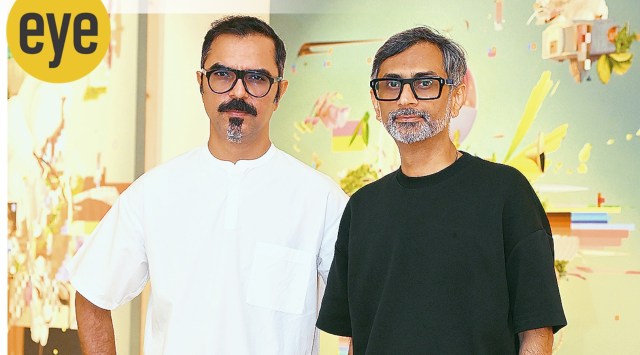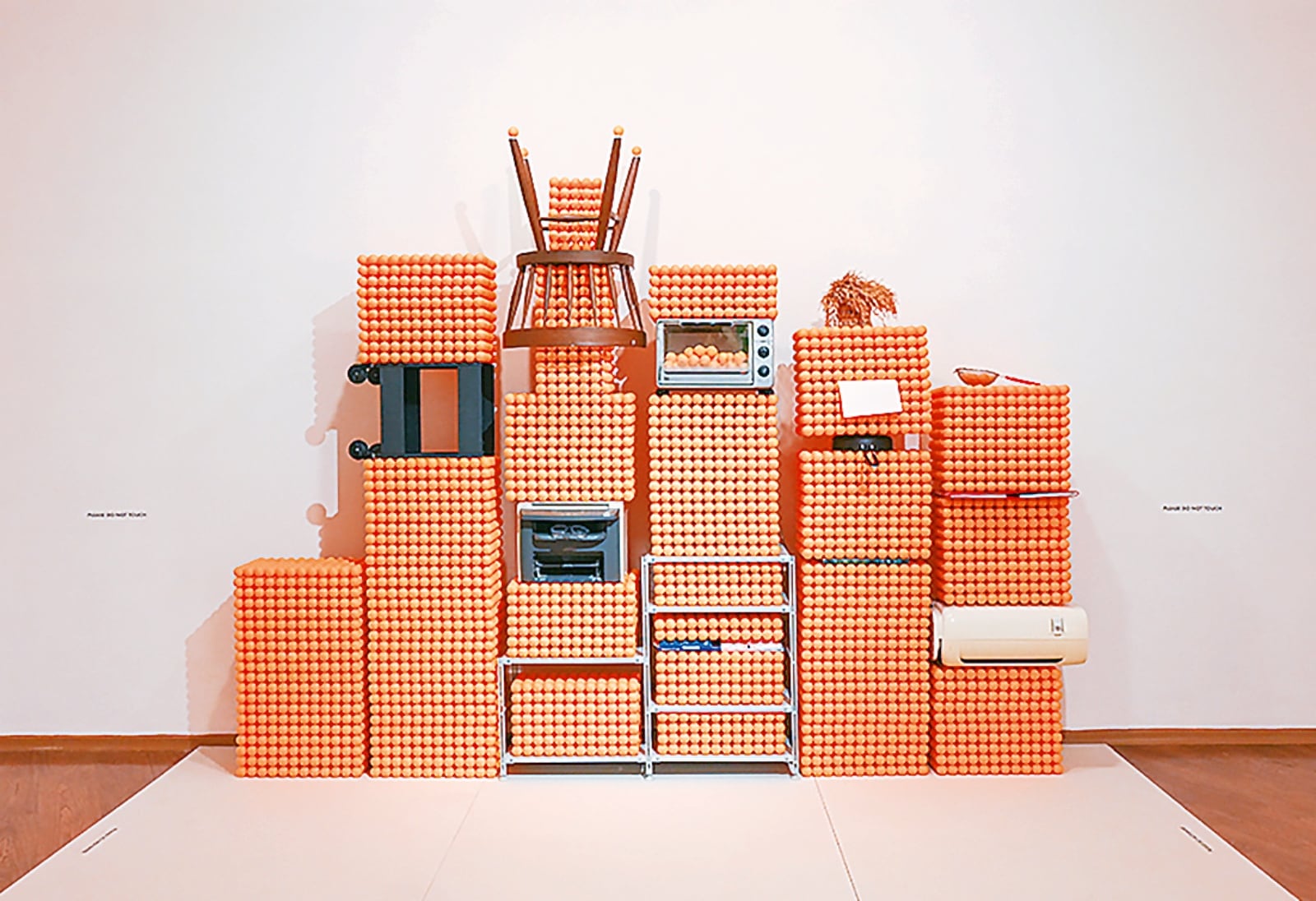How Thukral and Tagra are turning Indian art into play
Over their two-decade partnership, Jiten Thukral and Sumir Tagra have tried to make art accessible to all, engaging in playful ways to turn the audience into collaborators
 Artists Jiten Thukral and Sumir Tagra (Photo by Thukral & Tagra)
Artists Jiten Thukral and Sumir Tagra (Photo by Thukral & Tagra)
UNLIKE THE many exhibitions at the Lalit Kala Akademi in Delhi that invite viewers to contemplate in quietude, its galleries recently buzzed with laughter, cheers and the occasional sigh of defeat. The reason? A playful takeover by artist duo Jiten Thukral and Sumir Tagra. While the work titled Assets and Liabilities nudged participants to ponder economic volatility over a game of ping-pong, where the table imbibed demonetised Indian currency notes, another work Trust and Betrayal saw them entering into a dialogue with the self through a mirror image. In Nafrat/Parvah, penning an unpleasant memory earned them a free haircut — a cathartic process, responding to the polarised times.
As visitors queued for their turn, the artist duo switched roles and became their audience — observing the unfolding choreography of play. After all, their shared desire to make art more accessible had been one of the driving impulses when ‘T&T’ decided to collaborate two decades ago, building on a friendship that began at the Chandigarh College of Art in the mid-1990s, where Thukral was Tagra’s senior. Though Thukral moved to Delhi to pursue his master’s at College of Art, the two worked together again in Mumbai, where Thukral was art director with an advertising firm and Tagra was a visualiser. The latter quit within a fortnight after joining to pursue a postgraduate diploma at the National Institute of Design in Ahmedabad.
Soon, though, the two began collaborating on independent art projects and in 2004-05 catapulted into the spotlight with their fictitious brand BoseDK — a cheeky reference to the common Punjabi expletive — to critique consumer culture and also how art was becoming a mass-produced commodity. Their 2007 exhibition “Everyday Bosedk” at Nature Morte in Delhi saw the gallery being transformed into a satirical supermarket of “Bosedk” products that included teddy-bears and t-shirts. The Hershey’s chocolate syrup bottles carried photographs of young men from Delhi who had attained tourist visas to seek work overseas, with labels describing how they would classify as “Punjabi chocolate boys” due to their foreign sojourn. The two had also found their creative sync. Reflecting on their association, Tagra notes, “It’s the desire to make things, one begins with an idea the other responds to it. It’s also camaraderie, a trusting kinship.”
 Thukral & Tagra’s work brings together art, design and social engagement in playful ways (Photo by Thukral & Tagra)
Thukral & Tagra’s work brings together art, design and social engagement in playful ways (Photo by Thukral & Tagra)
The wit and incisiveness of their initial exhibitions have continued to shape their work that brings together art, design and social engagement in playful ways to engage with everyday culture, exploring themes of migration, consumerism, ecology, societal issues and collective responsibility. If their 2007 exhibition “Put It On”at Bose Pacia in New York raised awareness about HIV and safe-sex practices through a more accessible visual language, the ongoing project “Pollinator.io” supports alternative artistic practices. The 2010-12 “Match Fixed/Fixed Match” drew on the metaphor of cricket and arranged marriage to highlight how several women in Punjab had been abandoned by their NRI husbands, who married them with the lure of moving abroad.
Drawing on their personal histories and roots in Punjab, the two have also often turned to themes of home and the middle class. Tagra’s father was a businessman and his mother has roots in Ludhiana. Thukral’s father is an artist and wrestler who owns an akhada (wrestling arena) in Jalandhar and has farming land in Punjab. “We like to lean into areas we think are of interest and importance, and personal history does influence that understanding,” says Tagra.
Their longstanding engagement with farming issues also stems from their own understanding of the predicament. “We often ask ourselves what we can do about their concerns and to improve things,” adds Tagra. In 2017, when farmers marched towards Parliament in Delhi, the artists joined them — filming their movement and spending time with them at Ramlila Maidan. The footage resulted in a 23-minute documentary, Kisan Mukti March, that became part of their 2019 exhibition “Bread Circuses and I”. They also spent several days with them during the protests near the borders of Delhi in 2020-21, when they also supported a newsletter, ‘Trolley Times’, that documented the protests and featured poems, folk songs, artworks, portraits and essays by farmers and artists.
The archive now forms part of their ongoing exhibition “Uncounted Rounds” at Nature Morte in Delhi, where they are reflecting on the recurring cycles of sowing and failure under shifting climate and the lives left unacknowledged in official histories. The akhada has been reimagined as a field of endurance with the farmers wrestling constant challenges. “Our work is based on longstanding research and ground data and we hope to inspire younger artists to do the same,” says Tagra.
At their Gurugram studio, the duo is already sketching out the game plan for their next exhibition — one that will once again turn viewers into collaborators. At the forthcoming edition of Serendipity Arts Festival in Goa, the two will curate the segment “Multiplay 02: Soft Systems”, featuring multiple projects. Expect a dance-based piece by Melbourne-based dance academy Chunky Move and AI-generated healing by Zambian artist Dr Bwanga. “It’s our constant endeavour to explore how artistic practices are a complex and palpable web of ideas and we as audiences are woven into this constant pull-and-push of memory and experience, which could be backed by instructions and turn into an immersive that gets people involved in ways a static image possibly can’t,” says Tagra.





- 01
- 02
- 03
- 04
- 05


























